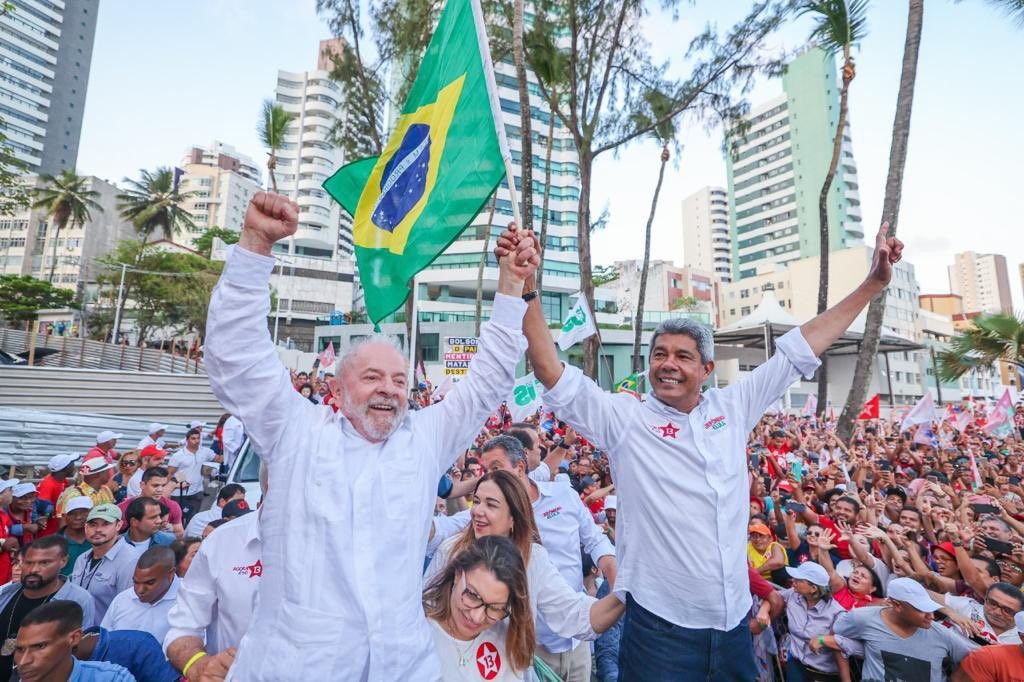It was the most defied and hotly contested election in Brazilian history, and in the end, democracy prevailed. Luiz Inácio Lula da Silva won by a margin of 2 million votes, defeating the incumbent in the tightest election in Brazilian democratic history. Picture source: Lula, October 13, 2022, Twitter, https://twitter.com/LulaOficial/status/1580336125637718016/photo/1.
Brazil after the Elections:
Where Will Lula Take the Country?
Prospects & Perspectives No. 65 November 16, 2022
By Bruna Santos
It was the most defied and hotly contested election in Brazilian history, and in the end, democracy prevailed. Luiz Inácio Lula da Silva and Jair Bolsonaro were leading figures of a confrontation that put one of the world’s largest democracies at stake, leaving behind a divided country and scars of a campaign tainted by defamation, fake news, and political violence. Lula won by a margin of 2 million votes, defeating the incumbent in the tightest election in Brazilian democratic history. The presidential transition in Brazil began smoothly, despite earlier alarms, and Brazil’s institutions had endured a difficult test.
Democrats and liberals, such as former president Fernando Henrique Cardoso, former governors of Brazil’s Central Bank Henrique Meirelles, Pérsio Arida, and others, got together to prevent a former army captain having a second chance to govern. This broad coalition began when Lula chose his historical opponent Geraldo Alckmin to run for the presidency.
Bolsonaro delivered a solemn and short speech 44 hours after the results came out, thanking the 58 million people who voted for him. He did not congratulate his opponent, but still, the Supreme Court interpreted his remarks as a concession. However, his base of supporters has erected hundreds of roadblocks around the country. This follows months of him undermining the reliability of the electronic ballot boxes and blaming electoral authorities for favoring his adversary. In his speech, he called it the result of “a sense of injustice of how the electoral process unfolded.” It’s fair to say that he was playing the same cards as U.S. President Donald Trump in his post-presidency.
Scars and defamation: images of a campaign
Bolsonaro’s coalition is a fair portrait of his conservative movement. His rise was due to deeper trends, such as conservatism, culture war politics, and nationalist symbols. His rhetoric, which criticizes political correctness, is resonating among Brazilian conservatives. And he established the roots of a solid right-wing movement in the small towns in the Brazilian countryside.
Social conservatism is rising in Brazil, with many Brazilians opposing abortion and favoring religious instruction in schools. In his campaign, Bolsonaro’s social media squad cautioned of the “spiritual risk” from his rival. Religion became the epicenter of the dispute, mainly looking to attract evangelical voters’’ support.
Lula’s Resurrection
In a stunning reversal of fortune, former Brazilian president Lula was elected for a third mandate. One year ago, he was behind bars on corruption charges. From now on, this historical political resurrection will be followed by governance and economic battles.
Lula will need to change some of his policies to govern Brazil effectively, as the nation has changed since he was last in power. Lula will face a country that is still angry about corruption scandals within his party and reeling from the economic and health impacts of the pandemic.
Lula plans to increase government spending to spur growth and put the State as the main driver of economic policymaking. However, with a fragile fiscal situation and critical opponents elected for Senate and Congress, it needs to be clarified how he will meet his campaign promises. The makeup of Congress matters too. With the new configuration of Congress, Lula should be able to pass bills. To make structural reforms, Lula will pull off complex negotiations with the opposition in Congress. Long-due tax reform is one example.
‘Brazil is Back’
Lula’s victory represents a turning point for Brazil. Bolsonaro’s administration led us to climate skepticism and the accelerating destruction of the Amazon rainforest. Amid warm congratulations from international leaders, expectations are high regarding Brazil’s climate diplomacy. However, implementing a transformative environmental agenda is easier said than done; here, too, complex congressional dynamics could be an obstacle. These limitations reinforce the importance of the private sector and international allies. Yet, luckily for Brazil, global leaders have already signaled an eagerness to collaborate on renewed preservation of the Amazon.
For that, the president-elect must nominate a credible economic team. Gleisi Hoffman, the Workers’ Party president, has said Lula’s government would not be “a PT government”; instead, it will reflect the broad front that elected him. But his government decisions will set the tone of what’s next for Lula on the international chessboard. The expectation of a moderate government internally should extend to Brazil’s international relations.
The world has changed, but if the past is indicative, we know Lula’s foreign policy and presidential diplomacy are pragmatic and conciliatory. Brazil and China’s diplomatic relations went through complicated times, and Bolsonaro was known for his combative comments about the Chinese communist leaders. However, trade and investments have suffered little throughout Bolsonaro’s years. Brazil was the leading destination for Chinese investment in 2021, mainly in agribusiness and energy.
Despite the rhetoric, Bolsonaro’s government has returned to a policy of more engagement. According to Brazil’s Ministry of Economy data, soybeans, iron ore, oil, beef, and cellulose accounted for almost 90 percent of all Brazilian exports to China last year.
Lula’s first time in government was essential to align Brazil with the Brics and to attract Chinese investments to Brazil. During the campaign, Lula pursued the support of business people with rhetoric that highlighted deindustrialization and pointed to China as the culprit. He waved protectionist measures to a group that constantly complained about Chinese competition and asked for government support and more trade defense. But the Brazilian industry is uncompetitive internationally due to more structural reasons, such as low-skilled labor, insufficient infrastructure, and the weight of a development model adopted in the 20th century based on high industrial protection against foreign products. China is the symptom, not the cause, of this low competitiveness.
A third presidential term for Lula could offer possibilities for Brazil to position itself to receive investors looking for nations with stable relations with the West, with no risks of war or authoritarian closures. For Lula, the challenge is how to open the Chinese market for Brazilian exports of higher value-added and make it less aggressive to an ongoing deindustrialization process. Industrial policy in Brazil needs to consider the errors of the past and the new reality of the country’s international insertion, with its strong economic ties both with China and the United States and Europe.
Lula has mentioned that he wants to distance himself from authoritarianism, and Brazil, like other democracies, has gone through a crisis beyond representation; it is also a crisis of agility and delivery capacity of the State. It is essential to find ways to make democratic institutions more agile and capable of solving people’s problems while also being loyal to democratic values.
(Dr. Bruna Santos is a Senior Advisor at the Brazil Institute, Wilson Center.)


